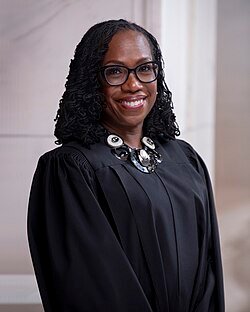Justice Ketanji Brown Jackson has made history as the first Black woman to serve on the United States Supreme Court. Born on September 14, 1970, in Washington, D.C., Jackson grew up in Miami, Florida, before returning to the nation’s capital area. Her rise to the highest court in the land reflects a career built on academic excellence, judicial experience, and a commitment to justice.
Jackson’s academic journey began at Harvard University, where she earned her Bachelor of Arts degree magna cum laude in 1992. She continued at Harvard Law School, graduating cum laude in 1996. During her time in law school, she was an editor of the prestigious Harvard Law Review, marking her as a standout legal scholar early in her career. Her education at Harvard laid a strong foundation for the roles she would later assume within the American judicial system.
After law school, Jackson clerked for several federal judges, including a notable clerkship with Justice Stephen Breyer on the U.S. Supreme Court from 1999 to 2000. This experience offered her a close-up view of the highest court’s inner workings, influencing her understanding of constitutional law and judicial responsibility. She also worked as a public defender and practiced law privately, focusing on appellate litigation and white-collar criminal defense. Her experience as a public defender distinguishes her among Supreme Court justices, many of whom have backgrounds as prosecutors or corporate lawyers.
Jackson’s judicial career formally began when President Barack Obama nominated her to the U.S. District Court for the District of Columbia in 2012. She served with distinction in this role, handling a variety of complex cases that showcased her analytical skills and dedication to fairness. Her reputation as a thorough and thoughtful judge grew, earning respect from peers and legal experts alike.
In 2021, President Joe Biden nominated Jackson to the influential U.S. Court of Appeals for the District of Columbia Circuit, often seen as a stepping stone to the Supreme Court. After a Senate confirmation process, she joined the appellate court and continued to build her judicial record. Her decisions on this court reflected a careful and moderate approach, often emphasizing respect for legal precedent and detailed examination of facts.
President Biden’s nomination of Ketanji Brown Jackson to the Supreme Court in 2022 marked a historic moment for the nation. Her confirmation by the Senate ended months of intense hearings and political debate, culminating in her swearing-in as the first Black woman justice. Her presence on the Court brings new perspectives, particularly given her background in public defense and her commitment to civil rights and justice reform.
Justice Jackson is known for her careful, methodical approach to the law. She weighs evidence thoroughly and demonstrates respect for the principles of precedent, which guide how courts interpret past decisions. This judicial philosophy places her in the moderate-liberal camp of the Court, though she is also recognized for her willingness to voice strong dissents when she believes the law or the Constitution is at risk.
In recent decisions, Jackson has been vocal about the limits of executive power. For example, in a high-profile case regarding former President Donald Trump’s plan to reorganize federal government agencies, she dissented from the majority opinion that allowed the administration to proceed with broad restructuring efforts before full legal review. She described the Court’s decision as “hubristic and senseless,” warning against unchecked executive authority and emphasizing the importance of lower courts’ roles in reviewing complex administrative changes.
Her judicial temperament is marked by professionalism and a firm commitment to fairness, qualities that have earned her praise from legal experts and colleagues across the political spectrum. As the Supreme Court faces increasingly contentious issues surrounding civil rights, administrative law, and executive power, Justice Ketanji Brown Jackson’s voice is expected to play a critical role in shaping the Court’s direction.
Jackson’s historic appointment is not only symbolic but substantive, providing the Court with a unique perspective informed by her diverse legal background and dedication to justice. Her journey from a law student at Harvard to a Supreme Court Justice exemplifies a deep commitment to public service and the rule of law. As she continues to serve, her influence will likely be felt on many landmark cases that define American law and society for years to come.







